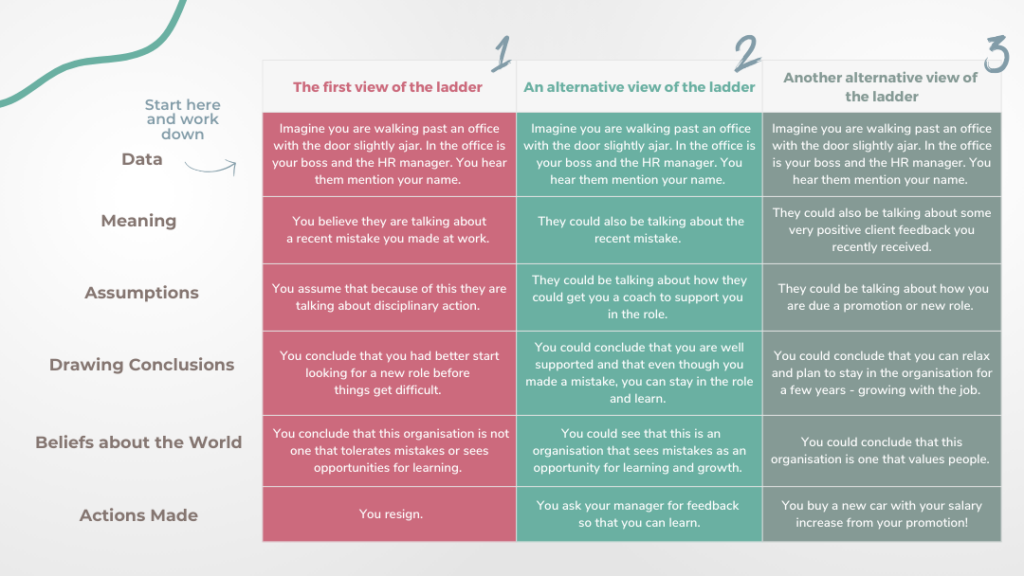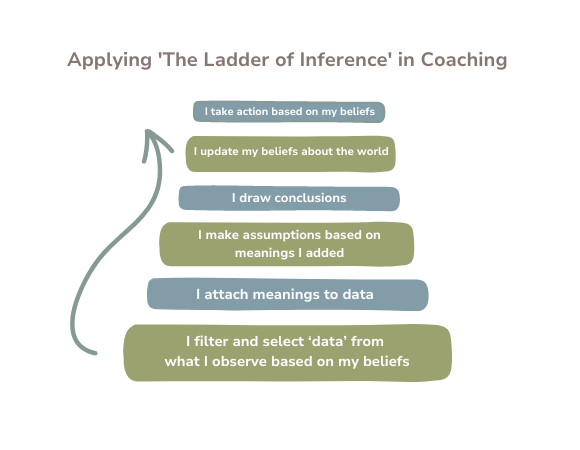
The Ladder of Inference in Coaching
Welcome to another addition to our coaching methodologies series, aimed at exploring various frameworks utilised by coaches to facilitate their coaching conversation. You can check out our previous blog post on the T-GROW coaching model.
Among the myriad coaching methodologies, the ladder of inference stands out as a particularly intricate framework for understanding how individuals perceive and interpret their life experiences.
In this blog post, we will explore the ladder of inference coaching methodology and practical applications in coaching practice.
Understanding the Ladder of Inference
Have you ever caught yourself making assumptions that turned out to be inaccurate? We’ve all been there at some point in our lives. As coaches, our goal is to challenge and refine the beliefs and assumptions that influence our clients’ perspectives.
In our Level 1 Coach Training Programme, we equip our students with this powerful tool —The Ladder of Inference. The ladder of inference is a concept developed by organisational psychologist Chris Argyris and his colleagues. Argyris introduced this concept in the 1970s as a way to explain how individuals process information and make decisions, particularly in organisational settings.
The ladder of inference particularly helps coaches help their clients examine sensitive triggers for specific behaviors and understand why they feel and act in certain ways. This tool helps clients revisit the situation and relook at all the facts again to see if other conclusions can be drawn from it.
Why Ladder of Inference in Coaching?
As humans, we often jump to conclusions without thoroughly examining all the evidence. It usually happens unconsciously without us even noticing. For example, if you see someone running directly towards you at speed – you have to jump out of the way to avoid them. What conclusions does your mind instantly draw about their situation?
The ladder of inference highlights how we as individuals can easily move from observable data to conclusions without thoroughly examining the steps in between.
We make quick and rash decisions without thinking through the facts and these impulses we make may not always be accurate assumptions of the situation. This can lead to misunderstandings, misinterpretations, and ineffective decision-making.
The process usually starts with us observing concrete data or having experiences. From there, consciously or unconsciously we select certain data to pay attention to based on our beliefs and prior experiences. Then we interpret this selected data through the lens of our existing beliefs, values, assumptions, and past experiences.
These interpretations lead to the formation of new beliefs and conclusions about the situation, which in turn influence the actions we take.
Here is an exercise you can try!

Look at this picture above. In our ICF trainings, we engaged our students, inviting them to share their thoughts on the elderly gentleman and what actions they would take if they saw him.
Responses include, “He might be feeling lonely” and “Perhaps he lacks companionship.” “He looks sad.”
They say that they will go and talk to him.
When challenged, we uncovered numerous underlying beliefs among our students. They seemed to assume that if an elderly person is seen sitting alone, loneliness is a likely explanation. But what if the gentleman actually enjoys solitude? What if he wanted peace and quiet? What if he was happy?!
What prompts us to make such assumptions?
In life, these assumptions we make, similar to the one about the elderly man, will arise constantly. It’s normal and it’s part of how our brain works. As coaches, we can help our clients observe and challenge those assumptions and beliefs.
By understanding and being aware of the steps in the ladder of inference, individuals and organizations can improve their ability to make more informed decisions and communicate effectively.
For a deeper understanding of how our brain functions, particularly in times of misery, you can take a look at our free masterclass on neuroscience behind misery at work.
Applying Ladder of Inference in Coaching
You can use this methodology in a range of coaching situations. One example is when a client is bringing a situation that has happened. Maybe they are struggling with a conversation they had with their manager. We start by jumping into the lowest part of the ladder, gradually progressing upwards. You have the freedom to stay at a specific level, backtrack, or move forward based on what insights emerge during your coaching conversation.
The primary goal is to facilitate your clients in evoking awareness of the problem or solution. This is aligned with one of the ICF coaching competencies that students are assessed against as part of their ICF ACC examination.
Definition of Evokes Awareness under ICF: Facilitates client insight and learning by using tools and techniques such as powerful questioning, silence, metaphor, or analogy
Stage 1: Filtering Data based on Beliefs and Values
We start from an observable piece of data. At this stage, you can work with your clients to observe their beliefs and assess their personal values. This is when your client starts filtering the fact that it’s possible that there’s other ways of seeing the situation.
Here are some questions you can use to reflect with your client on the situation..
- Write down in a few words what happened or what you observed
- What did you do, what did the other person do?
- Was there anything else that happened or was said that you might have forgotten?
Stage 2: Attaching Meanings to Data
In this stage, coaches can help clients notice these assumptions and biases that might be holding them back. By looking at why they believe, what causes this.
Here are some questions you can use to reflect with your client.
- What meaning did you draw from what happened or what you observed at the time?
- What feelings come up for you when you think of what happened?
- When you look at the situation now, is there any other meaning you could draw from the situation?
Stage 3: Exploring Assumptions and Biases
Coaches can help clients explore and challenge these assumptions and biases that may be limiting their potential or hindering their progress. Start by looking at the evidence supporting their assumptions. Work with what they’re seeing in the present moment and how they can look at the situation from another angle if their assumptions were wrong.
Here are some questions you can use to reflect with your client.
- What assumptions did you make based on this meaning at the time?
- What else could you be assuming? List down all the other possible assumptions.
Stage 4: Drawing Conclusions
At this stage, clients usually jump to a conclusion based on what they’ve observed in Stages 1-3. Coaches can help clients work through the conclusions to see if they’re looking at all the facts and thinking carefully about what they mean so that clients can make more informed choices.
Here are some questions you can use to reflect with your client.
- What were your conclusions based on your meaning and assumptions?
- Now that you look at other possible assumptions – are there any other conclusions you could draw?
Stage 5: Updating Beliefs about the World
Coaches can help clients explore their updated beliefs about the situation. By being open to new ideas and thinking about things in a different way, clients can change what they believe to be true.
Here are some questions you can use to reflect with your client.
- What did your original conclusions tell you about the world?
- What other views about the world could you hold?
Stage 6: Taking Action Based on Updated Beliefs
With a new understanding of their thinking, coaches can now help clients turn their new beliefs into actions. By doing things differently based on what they now believe, clients can make progress toward their goals.
Here are some questions you can use to reflect with your client.
- How did you act or what did you think as a result of your original conclusions?
- How could you act based on your new understanding?
Here’s an example of how this could look on a situation we all can relate to!
Imagine you are walking past an office with the door slightly ajar. In the office is your boss and the HR manager. You hear them mention your name. Now, let’s walk down the ladder of inference to see what conclusions and actions we’ll take.

The First View of the Ladder (Going through the ladder the first time)
- Data: Imagine you are walking past an office with the door slightly ajar. In the office is your boss and the HR manager. You hear them mention your name
- Meaning: You believe they are talking about a recent mistake you made at work.
- Assumptions: You assume that because of this they are talking about disciplinary action.
- Drawing Conclusions: You conclude that you had better start looking for a new role before things get difficult.
- Beliefs about the World: You conclude that this organisation is not one that tolerates mistakes or sees opportunities for learning.
- Actions: You resign
An Alternative View of the Ladder (Going through the ladder the second time)
- Data: Imagine you are walking past an office with the door slightly ajar. In the office is your boss and the HR manager. You hear them mention your name
- Meaning: They could also be talking about the recent mistake.
- Assumptions: They could be talking about how they could get you a coach to support you in the role.
- Drawing Conclusions: You could conclude that you are well supported and that even though you made a mistake, you can stay in the role and learn
- Beliefs about the World: You could see that this is an organisation that sees mistakes as an opportunity for learning and growth.
- Actions: You ask your manager for feedback so that you can learn.
Another Alternative view of the Ladder (Going through the ladder the third time)
- Meaning: They could also be talking about some very positive client feedback you recently received.
- Assumptions: They could be talking about how you are due a promotion or new role.
- Drawing Conclusions: You could conclude that you can relax and plan to stay in the organisation for a few years – growing with the job.
- Beliefs about the World: You could conclude that this organisation is one that values people.
- Actions: You buy a new car with your salary increase from your promotion!
Downside of the Ladder of Inference
The ladder of inference is a great tool. One downside is that there can seem too many possible steps (rungs) on this ladder. You can simplify the coaching process by simply asking these questions.
- What happened? What else happened that you missed?
- What assumptions did you make? Are there any other possible assumptions?
- What actions or thoughts happened? Are there any other possible thoughts or actions or ways of seeing the situation?
To sum up…
- Notice when a client is triggered to an emotion or reaction
- Explore the facts of the original event to see what happened
- Seek to understand what is triggered this particular emotion or reaction
- Explore assumption, conclusions, meaning, interpretations, the client is making and what conclusions can be drawn
The ladder of inference coaching methodology offers a valuable framework for promoting self-discovery, reflection, and action in the coaching process.
By helping clients relook into their interpretations, beliefs, and assumptions, coaches can facilitate deeper insight, expand perspectives, and empower clients to make more intentional choices in pursuit of their goals.
Want to learn more? Access our free taster programme to get full access to our training on Ladder of Inference.
Want to learn more? Access our free taster programme to get full access to our training on Ladder of Inference.

Who are we?
Learn more about Bailey Balfour, who we are, our values, and how 22 years of executive coaching experience inspired our acclaimed IFC accredited training programmes. Meet our faculty and discover why you might like to learn with us.

Free Taster
One of the most effective ways to decide whether our programme is the best for you is to experience a short taster – to see what you could expect and get a feel for the different elements of our courses including mentor coaching, our self-directed resources and our learning system. You can enjoy this taster at your own pace at any time so register now.

Book a call
Having a call with Jean Balfour, our programme director, can help answer questions about our pathways in a way that is relevant to you. How will you fit it in around your schedule? How will it speak to your existing role? How could it enhance your skillset for the future in your career? Why is accreditation important? Schedule a call with Jean and answer these questions and take the next step in enrolling.

Upcoming Events and Webinars
Join us in engaging (and free) webinars – from networking to coaching skills, and purposeful questions – there is bound to be an upcoming topic that speaks to you. Register now – and don’t worry – if you can’t make the live session we will send you a recording so that you can enjoy it in your own time.
Making Sense of Work Podcast
How’s Work at the Moment? We all work – and yet we often struggle with work. Even very ambitious people find parts of work difficult. This podcast is for you if you’d like to build a new and better relationships with your working life. Join Jean Balfour and guests as they explore everything to do with our working lives, starting with how do we find our purpose, how do make sense of our organisations and what major movements are we seeing in the workplace today?
About the Author
Jean Balfour is Managing Director of Bailey Balfour and Programme Director of our ICF Accredited Coach Training Programmes. Jean is passionate about helping people to have good conversations both at work and at home. She believes that coaching is a life skill and that you never regret learning to coach.


